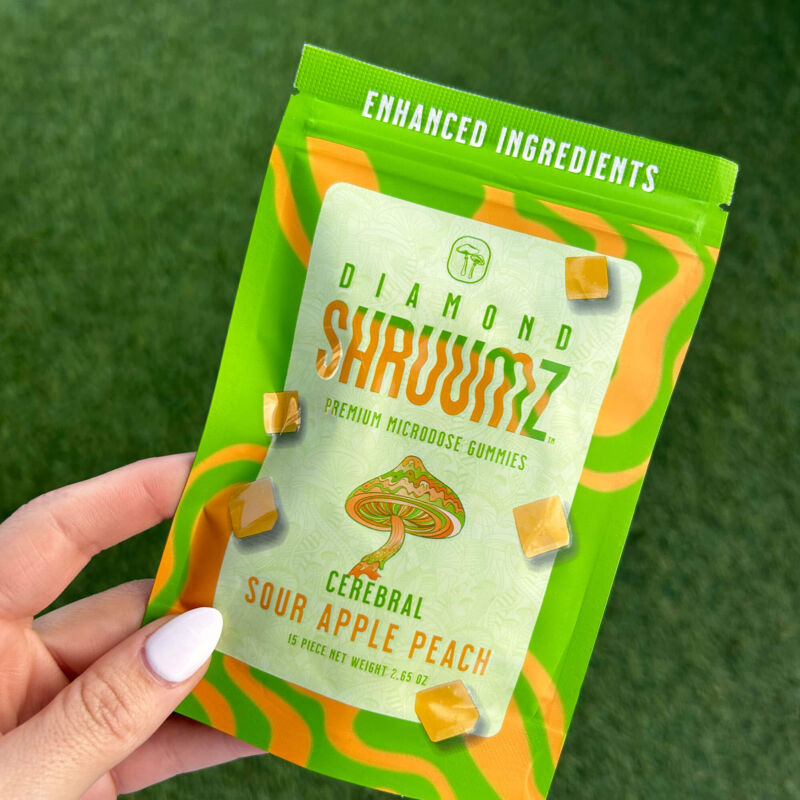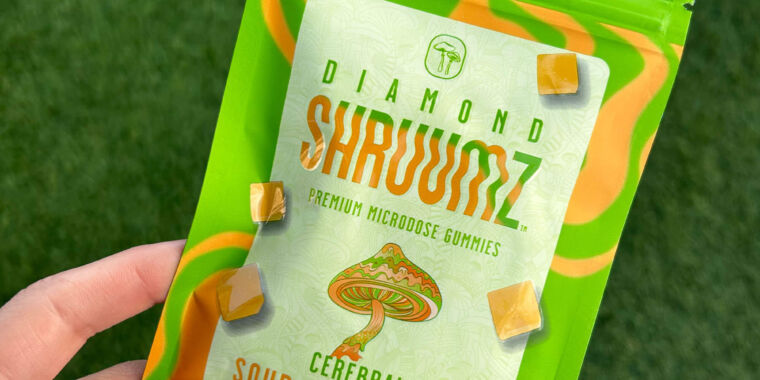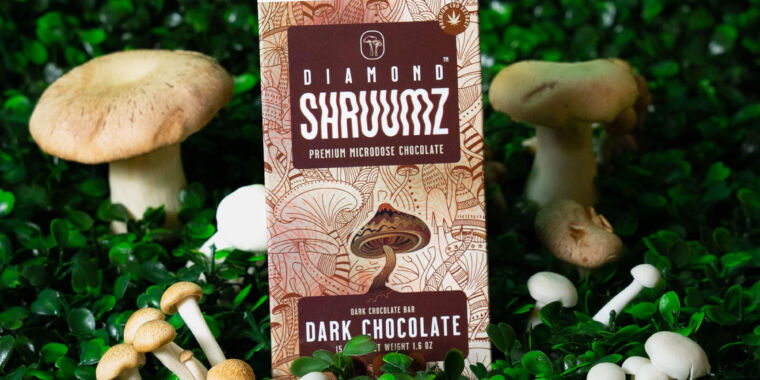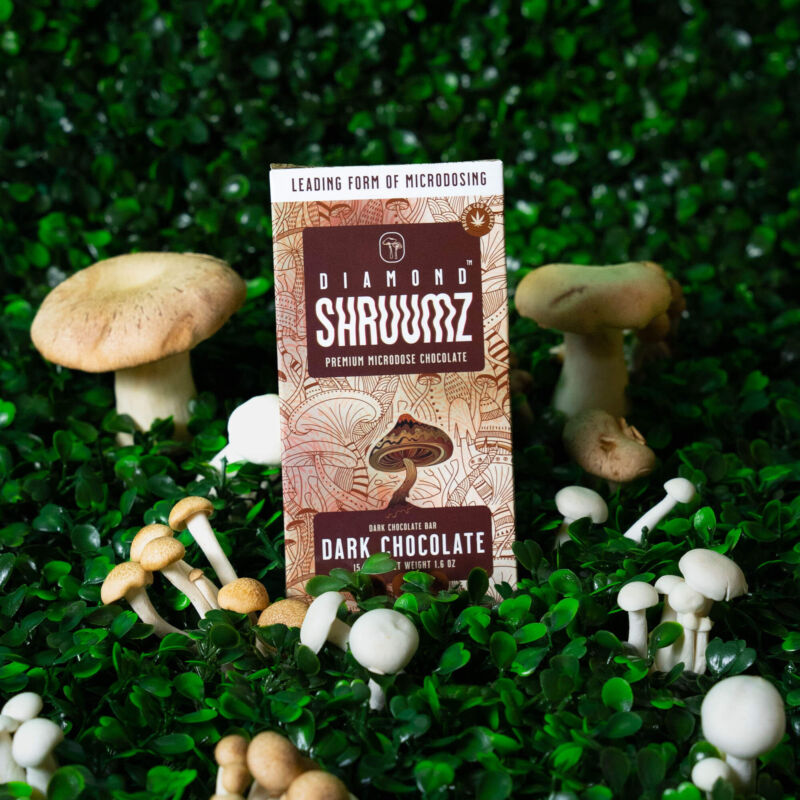Illegal drug found in Diamond Shruumz candies linked to severe illnesses
More drugs —
New testing finds psilocin, related to psilocybin, in gummies purchased in 2023.

Newly released testing data of Diamond Shruumz-brand gummies purchased in 2023 identified the presence of psilocin, a hallucinogenic drug closely related to the magic-mushroom drug psilocybin that is classified as a Schedule I drug, alongside psilocybin, heroin, and LSD.
The finding comes as Diamond Shruumz’s current line of gummies, chocolates, and candy cones is being recalled and are under active investigation in connection to a nationwide rash of severe illnesses, which have involved seizures, intubation, and intensive care. As of the latest update on July 15, 69 people in 28 states have been sickened after eating a Diamond Shruumz product. Sixty of the 69 sought medical care, 36 were hospitalized, and there is one potentially associated death under investigation.
The new finding of psilocin in the products, published by researchers at the University of Virginia, adds to growing concern about psychedelic mushroom candies generally. Although the candies are marketed as being legal, they have often been found to contain various undisclosed illegal drugs, gray market synthetic versions of drugs, as well as dangerous adulterants and contaminants.
In the ongoing investigation of Diamond Shruumz candies—led by the Food and Drug Administration and the Centers for Disease Control and Prevention, with the help of America’s Poison Centers and state and local partners—researchers have not identified psilocin in products linked to the illnesses. Instead, they have found a closely related synthetic hallucinogenic compound called 4-acetoxy-N,N-dimethyltryptamine, also known as psilacetin or 4-AcO-DMT. Psilacetin is thought to be metabolized into psilocin in the body and is said to have similar effects as taking magic mushrooms or psilocybin. The different testing results between the FDA-led investigation and the new UVA study may be due to possible formulation changes between 2023 and 2024 or simply differences in the products or batches of candies tested so far.
The UVA researchers, who published their findings in the CDC’s Morbidity and Mortality Weekly Report, looked into the mushroom candies after four adults reported illnesses to a local poison control center between September and November 2023. The people went to the emergency department with tachycardia, confusion, anxiety or somnolence, and nausea after eating gummy candies labeled as containing Amanita muscaria mushrooms. Amid their investigation into those cases, a 3-year-old also fell ill in June 2024 after accidentally eating two gummies sold as containing A. muscaria. All of the adults and the toddler recovered from their illnesses quickly, though the toddler was hospitalized for a day for observation.
Not legal or safe
A. muscaria is a legal hallucinogenic mushroom that contains psychoactive compounds ibotenic acid and muscimol. These resemble neurotransmitters in the brain and can cause gastrointestinal symptoms, agitation, and seizures.
The UVA researchers couldn’t track down the specific brands or products the sickened adults took, but they collected six similar products from nearby gas stations and smoke shops. Those six products included two Diamond Shruumz products, which were not sold as containing A. muscaria. Using liquid chromatography-mass spectrometry, the researchers found that the two Diamond Shruumz gummy products (Sour Peach Apple and Rainbow flavors) contained psilocin. The Rainbow flavor also contained caffeine.
In addition, a product labeled as “Wonderland Legal Psychedelics Cherry Nirvana” contained psilocin, the synthetic hallucinogen N,N-dimethyltryptamine, a compound found in kratom called mitragynine, and caffeine. A product labeled as “Urb Magic Amanita Mushroom Watermelon” contained psilocybin, psilocin, and the stimulant 2-phenethylamine. A product called “Psilly’s Legal Psychedelic Mushrooms Fruit Punch” contained the stimulant ephedrine, and the product “Tryp mushroom gummies” wasn’t found to contain any concerning compounds.
The UVA study was not able to test for ibotenic acid or muscimol. In Diamond Shruumz’s recall notice, the company said it had found higher than normal levels of muscimol in its products. FDA testing has not identified muscimol in product testing, according to results released so far.
“People tend to equate ‘legal’ with ‘safe,’ which is not necessarily the case. These products are not regulated and can contain any number of unlabeled substances which, when consumed, can cause undesired symptoms,” lead author of the UVA study Avery Michienzi said in a statement. “Some packages will have QR codes showing that the products were tested in a lab and contain only what they are labeled to contain. These have been found to be inaccurate.”
The FDA this week warned that even though all of Diamond Shruumz’s products have been recalled, they remain on the shelves of stores nationwide. The agency said it is reaching out to industry partners to raise awareness of the recall and monitoring the effectiveness of Diamond Shruumz’s recall efforts.
Illegal drug found in Diamond Shruumz candies linked to severe illnesses Read More »


